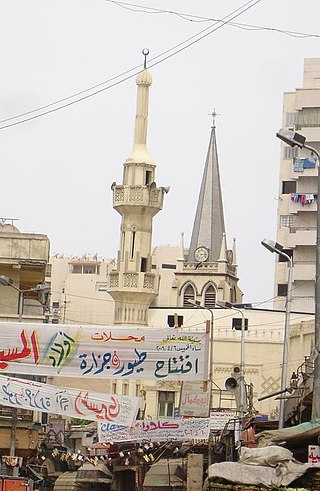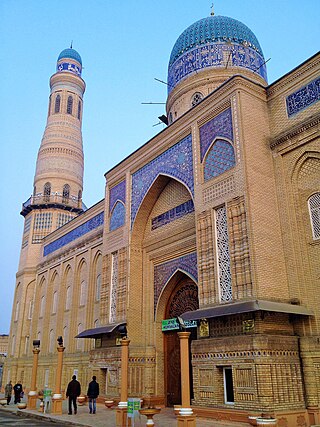Related Research Articles

Religion in Egypt controls many aspects of social life and is endorsed by law. The state religion of Egypt is Islam, although estimates vary greatly in the absence of official statistics. Since the 2006 census religion has been excluded, and thus available statistics are estimates made by religious and non-governmental agencies. The country is majority Sunni Muslim, with the next largest religious group being Coptic Orthodox Christians. The exact numbers are subject to controversy, with Christians alleging that they have been systemically under-counted in existing censuses.

Catholicism in Saudi Arabia is officially barred from being practised, though Catholics are allowed into the country for temporary work. There is a large expatriate Filipino community in Saudi Arabia, many of whom are thought to be Catholics. There are no dioceses in Saudi Arabia, which comes under the jurisdiction of the Apostolic Vicariate of Northern Arabia.

Sunni Islam is the dominant religion in Jordan. Muslims make up about 97.2% of the country's population. A few of them are Shiites. Many Shia in Jordan are refugees from Syria, Lebanon, and Iraq.

Christianity is the predominant religion in Uganda. According to the 2014 census, over 84 percent of the population was Christian, while about 14 percent of the population adhered to Islam, making it the largest minority religion. Anglicanism and Catholicism are the main Christian denominations in the country.

Accurate religious demographics are difficult to obtain in Saudi Arabia, but there are approximately 2.1 million Christians in Saudi Arabia in 2020.

Christianity is a minority religion in Yemen. The Yemeni constitution mentions religious liberty. There are three churches in Aden.

Christianity is a minority religion in Tajikistan.

Christianity is a minority religion in Libya. It has been present in Tripolitania and Cyrenaica since Roman times.

Christianity in Uzbekistan is a minority religion.

Christianity is the religion of 3.63% of the population of Oman in 2020. Ninety Christian congregations exist in the country.
Islam is the official religion in Kuwait, and the majority of the citizen population is Muslim.

Islam is the dominant religion in Libya.

Burkina Faso is a religiously diverse society, with Islam being the dominant religion. According to the latest 2019 census, 63.8% of the population adheres to Islam. Around 26.3% of the population practises Christianity, 9.0% follow Animism/Folk Religion, and that 0.9% are unaffiliated or follow other faiths.

Christianity is the largest religion in Mozambique, with substantial minorities of the adherents of traditional faiths and Islam.

Christianity is the most widely professed religion in Tanzania, but in the island of Zanzibar most of the population is Muslim.

According to the 2005 census, Christians accounted for 9 percent of the total population of the United Arab Emirates; estimates in 2010 suggested a figure of 12.6%.

Islam is the state religion of Saudi Arabia.

Islam is the predominant religion in Uzbekistan.

Qatar is an Islamic state with multi-religious minorities like most of the Persian Gulf countries with waves of migration over the last 30 years. The official state religion is Sunni Islam. The community is made up of Sunni and Shi’a Muslims, Christians, Hindus, and small groups of Buddhists and Baha’is. Muslims form 65.5% of the Qatari population, followed by Christians at 15.4%, Hindus at 14.2%, Buddhists at 3.3% and the rest 1.9% of the population follow other religions or are unaffiliated. Qatar is also home to numerous other religions mostly from the Middle East and Asia.
Eastern Orthodoxy in Saudi Arabia is a Christian minority consisting of people of various nationalities that are adherents of the Eastern Orthodox Church.
References
- ↑ World Religions Database at the ARDA website, retrieved 2023-08-08
- ↑ US State Dept 2022 report
- ↑ Christianity Today website, March 2023 article
- ↑ Central Intelligence Agency (28 April 2010). "Saudi Arabia". The World Factbook. Retrieved 22 May 2010.
- ↑ Cookson, Catharine (2003). Encyclopedia of religious freedom. Taylor & Francis. p. 207. ISBN 978-0-415-94181-5.
- 1 2 House, Karen Elliott (2012). On Saudi Arabia: Its People, past, Religion, Fault Lines and Future . Knopf. p. 235.
- ↑ US State Dept 2022 report
- ↑ United States Department of State 2009 report
- ↑ Johnstone, Patrick; Miller, Duane Alexander (2015). "Believers in Christ from a Muslim Background: A Global Census". Interdisciplinary Journal of Research on Religion. 11: 17. Retrieved 20 October 2015.
- ↑ Coptstoday.com, December 1, 2018.
- ↑ "For First Time Ever, Christian Mass Held Openly In Saudi Arabia (Special dispatch 7795)". memri.org. 6 December 2018. Archived from the original on 6 May 2019. Retrieved 6 December 2018.
- ↑ Christian Post website
- ↑ Open Doors website, retrieved 2023-08-08